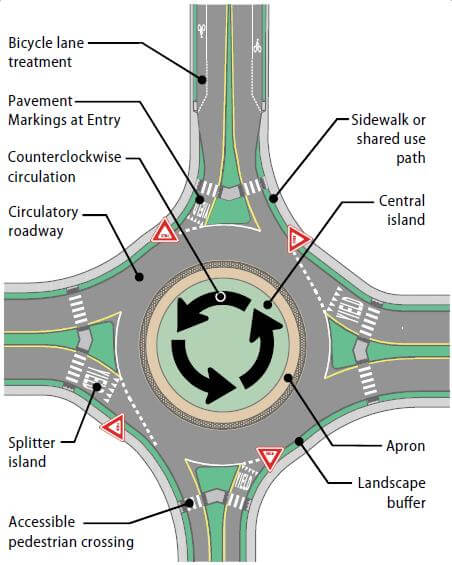
Roundabouts are one of many key safety measures that will be discussed at the Proven Safety Countermeasures workshop this fall.
The Proven Safety Countermeasures workshop will focus on reducing intersection and pedestrian fatalities and serious crashes through implementing key safety countermeasures across the state. They are planned to pilot in fall 2019.
The New Jersey Local Technical Assistance Program (NJLTAP) will work to develop a statewide “Proven Safety Countermeasures” workshop alongside its partners through a $16,000 grant that was recently awarded to the New Jersey Department of Transportation (NJDOT).
The NJDOT announced the grant, which is funded through the Federal Highway Administration’s (FHWA) Accelerating Safety Activities Program (ASAP). The half-day session will feature three pilot workshops with representatives from NJLTAP, NJDOT, FHWA, and Metropolitan Planning Organizations (MPOs) across the state presenting and producing the day’s events.
Its goal is to reduce intersection and pedestrian fatalities by spreading information about the FHWA Proven Safety Countermeasures training material produced by the Office of Safety. This will help speed up the process of implementing safety countermeasures, specifically related to intersections and pedestrian safety, across New Jersey.
Roundabouts, rumble strips, medians, and pedestrian crossing islands are just some of the key safety measures that will be shared with an audience of engineering, planning, and design staff from NJDOT, MPOs, county officials, and municipal personnel.
Janet Leli, associate director of Technology Transfer and director of NJLTAP at the Rutgers Center for Advanced Infrastructure and Transportation (CAIT), said that safety is one of NJLTAP’s core focus areas.
“We produce approximately 100 LTAP workshops every year to help local agencies improve their roads and safety as part of CAIT’s larger workforce development portfolio,” she said. “We are excited to put our training knowledge and expertise to use here and help develop an effective workshop that will play a role in improving safety on our roads.”
Funded through the FHWA and NJDOT, NJLTAP provides centralized, easily accessible training and resources such as workforce development classes, technical publications, and other safety resources. Following the delivery of the three pilot sessions, NJLTAP will coordinate the production of subsequent workshops and manage Professional Development Hour (PDH) credit for workshop participants.
NJDOT Commissioner Diane Gutierrez-Scaccetti described the importance of sharing safety knowledge and working with local agencies.
“The NJDOT is always looking for methods to improve road safety for the public, no matter what method of travel they utilize,” she said. “This FHWA grant allows us to share knowledge with local agencies across the state, ensuring the use of proven design practices and most importantly, saving lives.”
Currently, New Jersey is a FHWA focus approach state for both pedestrians and intersections, with approximately 24% of fatal and serious injury crashes involving intersections and 27% involving pedestrians and bicycles. Approximately 60% of fatal and serious injury crashes are occurring on the local system statewide.
To counter these numbers, decision-makers need to not only know the problem, but also how to identify the proper solution and a source of funding for it.
The workshop will be complemented by a component on potential sources of funding to help implement safety countermeasures, specifically the funding programs administered through the NJDOT Local Aid and Economic Development.
By bringing stakeholders together, organizers hope to gain widespread implementation of these proven safety countermeasures and move closer to achieving local and state safety goals.
“By making these safety recommendations known, we are giving stakeholders and decision makers the tools needed to make educated choices when looking at roadway safety issues related to intersections and pedestrian safety,” Leli said. “This is an important step toward improving safety in those areas and overall roadway safety in New Jersey.”
The Proven Safety Countermeasures workshops will pilot in fall 2019.

